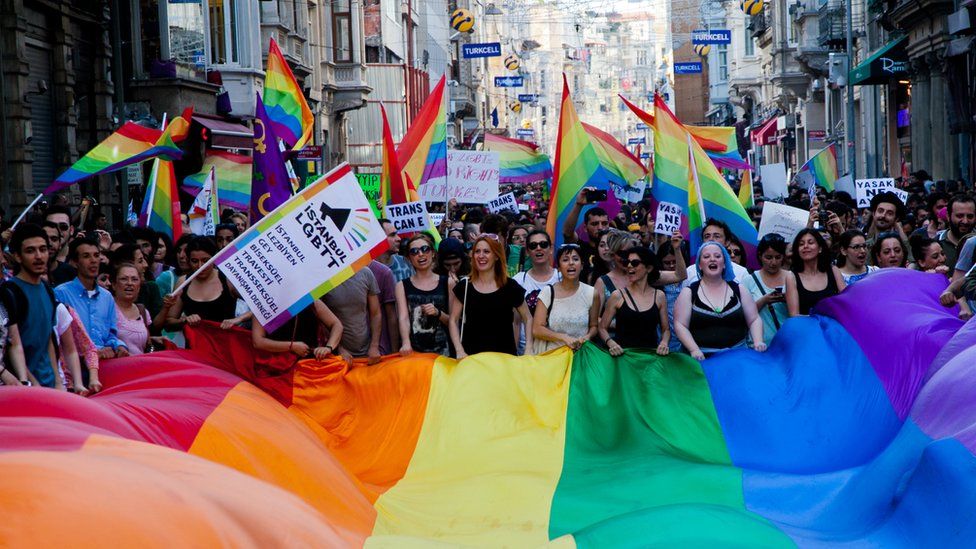LGBTQIA+ travelers are those who identify as lesbian, gay, bisexual or transgender, plus queer or questioning, intersex or asexual individuals. It also includes those who identify beyond these commonly used sexualities and gender expressions. Everyone has the right to feel safe, so we’ve put together a quick guide to safety for LGBTQIA+ folks traveling in Turkey.
Turkey has a complex history when it comes to LGBTQ+ rights. While homosexuality has been legal in Turkey since the 19th century, gay marriage is still not recognized or performed in the country.
The Legal Situation for LGBTQ+ Individuals
While homosexuality itself is not illegal, Turkey offers very few legal protections for LGBTQ+ individuals There are currently no laws prohibiting discrimination based on sexual orientation or gender identity when it comes to employment, housing, or public services
Same-sex marriage is also not legally recognized in Turkey, The country’s civil code defines marriage as being between a man and a woman only There are no provisions for civil partnerships or unions that could provide legal rights to same-sex couples,
Adoption by same-sex couples is similarly not allowed under Turkish law. Only married couples consisting of a man and a woman can adopt children together. Single LGBTQ+ individuals may be able to adopt in some circumstances, but joint adoption by same-sex partners is prohibited.
Societal Attitudes and Challenges
Despite the lack of legal persecution, Turkish society remains largely conservative in its views towards LGBTQ+ individuals. Homophobia and transphobia are still common, and many LGBTQ+ people face discrimination in their daily lives.
Pride parades and other public events in support of LGBTQ+ rights have often been met with hostility. Police have frequently dispersed crowds with rubber bullets tear gas, and other violent methods when such events are held.
Advocacy organizations such as KAOS GL have documented many accounts of LGBTQ+ individuals facing harassment, bullying, or outright attacks because of their sexual orientation or gender identity. Social acceptance remains limited.
Efforts Towards Legalizing Same-Sex Marriage
Currently, there are no active legislative efforts to legalize same-sex marriage in Turkey. Advocacy groups continue to campaign for increased rights and protections, but the issue of marriage equality has not gained significant momentum.
With the current administration being conservative on social issues, it seems unlikely that same-sex marriage will become legal in Turkey in the near future. The country will likely remain lagging behind other European nations that have adopted inclusive marriage laws.
Looking Ahead
While the path to marriage equality in Turkey appears long, LGBTQ+ advocates remain hopeful. Continued activism and international pressure could slowly sway public opinion and build support for legalizing same-sex marriage.
However, Turkish LGBTQ+ individuals and couples should not expect to be able to legally marry within their own country for the foreseeable future. Without further legislative action, same-sex marriage will remain prohibited and unrecognized. Those seeking marriage will need to consider traveling abroad to tie the knot.

Is Turkey safe for LGBTQIA+ travelers?
LGBTQIA+ travelers should be aware that while Turkey is nominally secular, it can also be very conservative and negative attitudes towards queer individuals are common, particularly outside major cities in more remote towns. Gay couples are advised to use discretion and avoid public displays of affection. That said, same-sex couples in Turkey are also unlikely to engage in PDAs such as kissing as it’s often frowned upon in Turkish society.
Transgender travelers should also be aware that trans people in Turkey report being the targets of violence and overt discrimination.
LGBTQIA+ rights in Turkey
While same-sex relationships and non-normative gender presentation are not against the law in Turkey, LGBTQIA+ people have no legal protection from discrimination. Legal prohibitions of ‘offenses against public morality’ can and have been used to persecute LGBTQIA+ folks, though the likelihood of this being used to target travelers is low.
